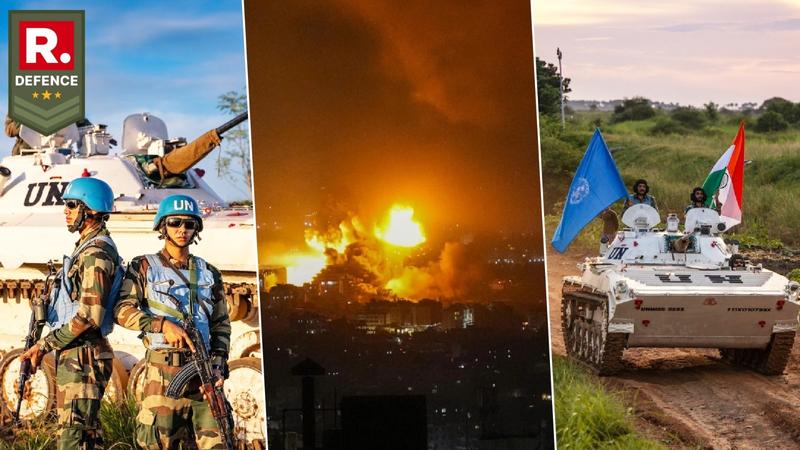Published 14:43 IST, October 5th 2024
Indian UNIFIL Battalion Stands Firm Amid Israeli Incursion in Southern Lebanon, Urges De-Escalation
The Indian battalion serving under the United Nations Interim Force in Lebanon (UNIFIL) remains operational despite escalating tensions.

Jerusalem, Israel – The Indian battalion serving under the United Nations Interim Force in Lebanon (UNIFIL) remains stationed and operational despite escalating tensions in the region, following Israel's targeted incursion into southern Lebanon. The battalion, consisting of over 900 Indian peacekeepers, has been confirmed to be safe and continues to fulfill its mandate in the wake of the Israeli Defense Forces' (IDF) military actions against Hezbollah forces near the Israel-Lebanon border.
According to a UNIFIL source in southern Lebanon, "The (Indian) battalion of more than 900 people is holding its position and everybody is safe," indicating the readiness and resolve of the contingent to maintain its peacekeeping role. The source further added that despite the precarious security situation, the Indian contingent remains committed to its responsibilities under the UN mandate.
Israeli Incursion into Southern Lebanon
The escalation began on Tuesday when the IDF launched a "targeted and limited" ground operation into southern Lebanon, specifically focusing on Hezbollah infrastructure and military sites in Lebanese villages along the border. The incursion is part of Israel’s efforts to neutralize Hezbollah's military capabilities, which Israel considers an immediate threat to its northern towns and communities.

In a statement, the IDF confirmed that the ground offensive was supported by air and artillery strikes. The operation is also seen as part of a broader strategic effort to push Hezbollah forces northward, in line with United Nations Security Council (UNSC) Resolution 1701, which mandates that only the Lebanese Armed Forces (LAF) and UN peacekeepers should operate south of the Litani River.
UNIFIL has confirmed that it was notified in advance by the IDF regarding the incursion and is closely monitoring the situation. Despite the military operations taking place within its area of operation, UNIFIL emphasized that its peacekeepers would remain in their positions and continue to fulfill their mandate of monitoring the cessation of hostilities.
In a statement, UNIFIL called on all actors involved to step back from further escalatory actions and urged both sides to adhere to the cessation of hostilities. As tensions rise, UNIFIL peacekeepers, including the Indian battalion, have focused on maintaining stability and ensuring that the conflict does not spiral into a broader regional confrontation.
UNIFIL Operating with 10,500 Peacekeepers
India is a long-standing contributor to UN peacekeeping missions and has been an integral part of UNIFIL since its inception. The Indian battalion is one of the largest contingents within UNIFIL, with more than 900 personnel deployed in southern Lebanon. In total, UNIFIL operates with approximately 10,500 peacekeepers drawn from 50 countries, making it one of the largest UN peacekeeping operations in the world.

The mission’s activities are carried out in coordination with the Lebanese Armed Forces, with about 17% of operations being joint efforts. Additionally, UNIFIL is supported by a five-vessel Maritime Task Force, which monitors Lebanon’s coastal waters to prevent arms smuggling and secure the area.
UNIFIL’s Mandate and Regional Security
UNIFIL was initially established in 1978 through UNSC resolutions 425 and 426, with the primary objective of overseeing the withdrawal of Israeli forces from southern Lebanon and assisting the Lebanese government in restoring its authority in the region. The mission was further expanded following the 2006 Israel-Hezbollah conflict, with the passage of UNSC Resolution 1701.
This resolution tasked UNIFIL with monitoring the cessation of hostilities, ensuring that no unauthorized armed personnel operate in southern Lebanon, and supporting the LAF in their efforts to maintain security. As part of its mission, UNIFIL peacekeepers routinely patrol the Blue Line—the demarcation between Israel and Lebanon—to monitor compliance with the ceasefire agreement.
Rising Regional Tensions
The ongoing conflict between Israel and Hezbollah has raised concerns of a broader regional war, with both sides remaining entrenched in their positions. Hezbollah, backed by Iran and Syria, has vowed to retaliate if Israeli operations continue to intensify, while Israel insists that its actions are defensive in nature, aimed at protecting its civilians from Hezbollah’s growing military presence near the border.

With international diplomatic efforts to broker a ceasefire currently at an impasse, UNIFIL’s role in monitoring and de-escalating tensions becomes even more crucial. The situation remains volatile, and the potential for further conflict along the Israel-Lebanon border looms large. Nonetheless, the Indian battalion within UNIFIL, along with other peacekeepers, continues to serve as a stabilizing force in this fragile and tense environment.
Updated 14:43 IST, October 5th 2024




